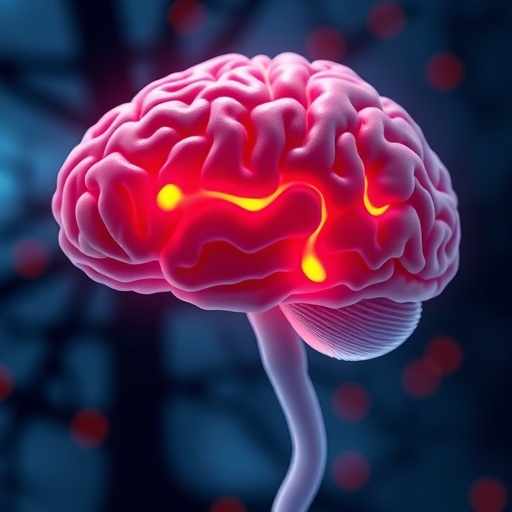In a groundbreaking study that intertwines mental health and microbiology, researchers have uncovered how prenatal depression might instigate depressive-like behaviors and neuroinflammatory changes in offspring through alterations in the gut microbiota. This pioneering work offers compelling evidence shedding light on the critical role of maternal mental health, gut microbial composition, and brain inflammation interactions during early development, potentially revolutionizing our understanding of depression’s origins and therapeutic targets.
Scientists have long sought to decipher the complex biological underpinnings of depression, a debilitating psychiatric condition that affects millions worldwide. The latest research advances this quest by revealing the profound influence of prenatal maternal depressive states on offspring behavior and brain physiology through gut microbiota modifications. Germ-free mice, conventionally devoid of microorganisms, became vital investigative models to isolate and examine the causative roles of specific microbial communities inherited from prenatally depressed mothers.
The study utilized fecal microbiota transplantation from depressed pregnant subjects to germ-free murine models, thereby simulating the vertical transmission of microbiota alterations that can occur in humans during gestation. Offspring colonized with these microbiota exhibited significant depressive-like phenotypes, assessed through well-validated behavioral paradigms such as the forced swim test and sucrose preference test. These findings underscore the potency of maternal gut microbiome dysbiosis as a determinant for neurobehavioral outcomes postnatally.
Beyond observable behavior, the researchers delved deeply into neuroimmune dynamics, particularly focusing on hippocampal neuroinflammation as a mechanistic substrate linking altered gut flora to depression-like states. The hippocampus, an essential brain region implicated in mood regulation and cognitive functions, showed elevated expression of pro-inflammatory cytokines and increased microglial activation in offspring hosting depression-associated microbiota. This neuroinflammatory milieu potentially disrupts synaptic plasticity and neuronal circuitry, fostering vulnerability to depressive disorders.
Of particular interest is the bidirectional communication within the microbiota-gut-brain (MGB) axis, a complex signaling network mediating interactions between intestinal microbes and central nervous system functions. This axis involves intricate molecular dialogs including neurotransmitter synthesis, immune modulation, and vagus nerve signaling. The maternal depressive microbiota appear to perturb this delicate system, thereby inducing systemic and brain-specific inflammatory responses that manifest as mood dysregulation.
The implications of these findings are monumental, suggesting prenatal mental health profoundly shapes offspring’s microbial ecosystems, thereby programming neurodevelopmental trajectories toward psychopathology. Crucially, the research supports hypotheses that depression is not solely a neurochemical imbalance confined to the brain but a multifaceted disorder integrating gut microbial constituents and systemic inflammation. This integrative perspective invites novel intervention paradigms targeting maternal microbiota regulation to preempt offspring susceptibility.
The use of germ-free animal models was pivotal, isolating the contributory role of microbiota independent from genetic or environmental confounders. Their sterility allowed for definitive transplantation of depression-associated gut microbes, conclusively demonstrating causality rather than correlation. This methodological rigor bolsters confidence in translating findings towards human clinical contexts, where maternal microbiota-targeted therapies during pregnancy could mitigate intergenerational transmission of mental illness.
Moreover, the study opens avenues for exploring specific microbial taxa and metabolites responsible for triggering neuroimmune cascades in neonates. Identifying key bacterial strains that drive hippocampal inflammation and behavioral abnormalities may lead to precision microbiota modulation therapies, such as probiotics, prebiotics, or dietary interventions tailored to pregnant women experiencing depression.
At a molecular level, the investigation revealed increased expression profiles of inflammatory mediators including TNF-α, IL-6, and IL-1β in the hippocampus, signifying heightened innate immune activation. Microglial morphology changes corroborated a shift toward pro-inflammatory phenotypes. These cellular alterations correlate with synaptic dysfunction, supporting mechanistic links between inflammation and impaired neuroplasticity characteristic of depressive disorders.
This study also adds to growing evidence implicating neuroinflammation as a central player in depression, particularly emphasizing early-life origins. The prenatal window emerges as a critical period during which environmental factors, including maternal psychological states, can epigenetically and microbiologically sculpt brain immune environments, priming offspring for later psychiatric vulnerabilities.
Future research directions may incorporate longitudinal studies assessing microbiota-brain-behavior dynamics beyond the early postnatal phase, evaluating whether depressive-like effects persist or remit with age. Additionally, examining sex differences in microbiota-driven neurodevelopmental outcomes could elucidate why females exhibit higher rates of depression, potentially rooting sex-specific microbial and immune mechanisms.
Overall, this research signifies a paradigm shift in neuropsychiatry, positioning gut microbiota not just as correlates but as active actors in prenatal programming of depression. The intricate dialogues between maternal mood states, microbial communities, and offspring neuroimmune health unveiled here pave the way for transformative mental health strategies emphasizing maternal well-being, microbiome stewardship, and neuroinflammatory control from pregnancy onward.
As depression remains a global burden with limited fully effective treatments, harnessing these insights offers hope for innovative prevention and intervention approaches. By targeting the microbiota-gut-brain axis during critical developmental windows, clinicians may one day interrupt pathological trajectories before depressive symptoms manifest, improving lifelong mental health resilience for future generations.
This research thus exemplifies the power of integrative, multidisciplinary science in decoding complex brain disorders, highlighting how microbiology, immunology, neuroscience, and psychiatry converge to unravel mysteries of human behavior and psychological disease. It serves as a clarion call to broaden our lens beyond neurotransmitters to incorporate microbiotic and immune ecosystems into the mental health paradigm, promising transformative advances ahead.
Subject of Research: The impact of prenatal depression-associated gut microbiota on depressive-like behaviors and hippocampal neuroinflammation in offspring.
Article Title: Prenatal depression-associated gut microbiota induces depressive-like behaviors and hippocampal neuroinflammation in germ-free mice.
Article References:
Cao, Y., Fan, X., Zang, T. et al. Prenatal depression-associated gut microbiota induces depressive-like behaviors and hippocampal neuroinflammation in germ-free mice. Transl Psychiatry 15, 383 (2025). https://doi.org/10.1038/s41398-025-03606-x
Image Credits: AI Generated




